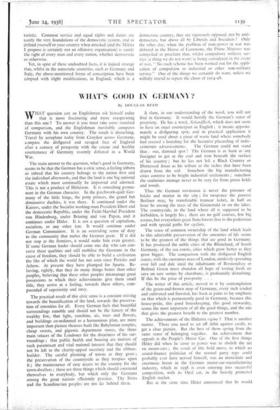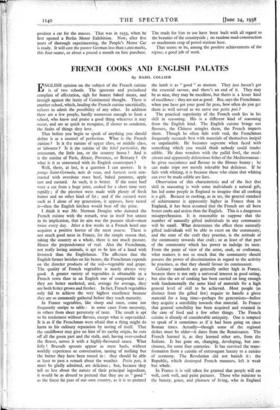WHAT'S GOOD IN GERMANY ?
By DOUGLAS REED
WHAT question can an Englishman ask himself today that is more fascinating and more exasperating than this one ? To answer it you must take some standard of comparison, and . the Englishman inevitably compares Germany with his own country. The result is disturbing. Travel by aeroplane today from Croydon across Germany, compare the disfigured and ravaged face of England after a century of prosperity with the serene and healthy countenance of Germany recently defeated in a World War.
The main answer to the question, what's good in Germany, seems to be that the German has a civic sense, a feeling inborn or inbred that his country belongs to the nation first and the individual afterwards, and that the land is one big national estate which must continually be improved and adorned. This is not a product of Hitlerism. It is something perma- nent in the German character. In the patchwork-quilt Ger- many of the little kings, the petty princes, the grand but diminutive duchies, it was there. It continued under the Kaisers, under the Socialist working-man President Ebert and the democratic Republic, under the Field-Marshal President von Hindenburg, under Bruning and von Papen, and it continues under Hitler. It is not a question of capitalism, socialism, or any other ism. It would continue under German Communism. It is an overriding sense of duty to the community that makes the German great. If it did not stop at the frontiers, it would make him even greater. If some German leader should come one day who can con- serve these qualities and still mobilise the Germans in the cause of freedom, they should be able to build a civilisation the like of which the world has not seen since Pericles and Athens. At present they have plumped for Sparta. Be- lieving, rightly, that they do many things better than other peoples, believing that these other peoples mismanage great possessions to which their achievements give them small title, they arrive at a feeling, towards these others, com- pounded of superiority and envy.
The practical result of this civic sense is a constant striving towards the beautification of the land, towards the preserva- tion of amenities for all. Every German feels that beautiful surroundings ennoble and should not be the luxury of the wealthy few, that light, sunshine, air, trees and flowers, and buildings co-ordinated to a harmonious plan, are more important than picture theatres built like Babylonian temples, cheap sweets, and gigantic department stores, the three main solaces of the Londoner for the dreariness of his sur- roundings ; that public health and housing are matters of such paramount and vital national interest that they should not be left to the charity-appeal secretary and the ribbon- builder. The careful planning of towns as they grow ; the preservation of the countryside as they trespass upon it ; the maintenance of easy access to the country for the town-dwellers ; these are three things which should commend themselves to everybody, but which only the Germans among the great nations efficiently practice. The Swiss and the Scandinavian peoples are not far behind them. A slum, in our understanding of the word, you will not find in Germany. It would horrify the German's sense of propriety. He has a word, Schandfleek, which does not seem to have an exact counterpart in English ; it means approxi- mately a disfiguring spot, and in practical application it might be used about a piece of waste land where somebody had erected a hoarding for the lucrative placarding of indis- criminate advertisements. The German could not stand that : out, damned spot ! The German is as keen as any foreigner to get at the coal and iron beneath the surface of his country ; but he has not left a Black Country or Distressed Areas as his tribute to the riches that have been drawn from the soil. Somehow the big manufacturing cities contrive to be bright industrial settlements ; somehow the coalmines manage never to be very far from green fields and woods.
Thus the German townsman is never the prisoner of bricks and mortar in the city ; for twopence the poorest Berliner may, by transferable tramcar ticket, in half an hour be among the trees of the Grunwald or on the lakes. The countryside, in the land where all is supposed to be forbidden, is largely his ; there are no golf courses, few big estates, but everywhere great State forests free to the pedestrian and with special paths for cyclists.
The sense of common ownership of the land which leads to this admirable preservation of the amenities of life seems to be the greatest of the things that are good in Germany. It has produced the noble cities of the Rhineland, of South Germany, of the sea coasts, cities which grow better as they grow bigger. The comparison with the disfigured English coasts, with the enormous mass of London, aimlessly spreading over hill and dale until the inhabitants of Bermondsey or Bethnal Green must abandon all hope of tasting fresh air save on rare sorties by charabanc, is profoundly disturbing. If this be the price of prosperity . . .
The writer of this article, moved to it by contemplation of the green-and-brown map of Germany, every inch tended and cultivated and forested, has been at pains to lay emphasis on that which is permanently good in Germany, because this house-pride, this good housekeeping, this good stewardry, seems the most important of all the good things, and the one that gives the greatest benefit to the greatest number.
The achievements of the Hitlerist regime? That is another matter. There you need to set off debit against credit, to get a clear picture. But the best of them spring from the same sense of belonging together. An achievement that appeals is the People's Motor Car. One of the first things Hitler did when he came to power was to abolish the tax on motor-cars ; the result of this bold move, to which no sound-finance politician of the normal party type could probably ever have nerved himself, was an immediate and enormous boom in the German motor-car-manufacturing industry, which in 1938 is even entering into successful competition, with its Opel car, in the heavily protected English market.
But at the same time Hitler announced that he would produce a car for the masses. That was in 1933, when he first opened a Berlin Motor Exhibition. Now, after five years of thorough experimenting, the People's Motor Car is ready. It will cost the poorer German less than r,000 marks, this four-seater, or about a pound a month on hire purchase. The roads for him to use have been built with all regard to the beauties of the countryside ; no random road-construction or mushroom crop of petrol stations here.
That seems to be, among the positive achievements of the regime, a good job of work.















































 Previous page
Previous page